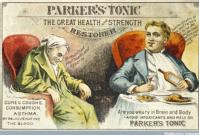Seminar 17: Defying Gravity: Middle Age
 |
This week’s seminar focuses on the various ploys and health interventions intended to stop the decay and disease of middle age, a period marked by both the occurrence of chronic illness and disease associated with poor lifestyle – such as heart disease, stroke and diabetes – and by attempts to halt and reverse time, though diet, exercise and cosmetic interventions. Throughout the twentieth century deaths from infectious disease declined, but now we face the problem of a population who get older and have higher expectations, but who are not necessarily healthier. |
1. What are the specific medical risks of middle age and how have these changed in the modern period?
2. How far should the state intervene in lifestyle choices that lead to poor health?
Seminar Reading:
Elizabeth Toon,'"Cancer as the General Population Knows It": Knowledge, Fear, and Lay Education in 1950s Britain', Bulletin of the History of Medicine, 81 (2007), 116-138. Part of a special issue on cancer in the twentieth century. e-journal
Ina Zweiniger-Bargielowska, ‘The Culture of the Abdomen: Obesity and Reducing in Britain, circa 1900-1939’, Journal of British Studies, 44 (2005), 239-73. e-journal
Alex Mold, '"Everybody Likes a Drink. Nobody Likes a Drunk". Alcohol, Health Education and the Public in 1970s Britain', Social History of Medicine, 17 (2016), 612-636. e-journal
John Welshman, ‘“Bringing Beauty and Brightness to the Back Streets”: Health Education and Public Health in England and Wales, 1890–1940’, Health Education Journal, 56 (1997), 199–209. e-journal
Primary Sources
See the NHS choices website under the section 'live well': http://www.nhs.uk/pages/home.aspx
Locate and bring to the seminar a health promotion campaign leaflet or poster from Wellcome Images or another resource.
Additional Reading:
J. Benson, Prime Time: A History of the Middle-Aged in Twentieth-Century Britain (London, 1997).
Virginia Berridge, Marketing Health: Smoking and the Discourse on Public Health in Britain, 1945-2000 (Oxford: Oxford University Press, 2007).
K. Brown, 'Smoking in Northern Ireland: A Case Study in Local Health Education', Social History of Medicine, 17:2 (2004), 285-299. e-journal
Kathy Davis, Reshaping the Female Body: The Dilemmas of Cosmetic Surgery (New York and London: Routledge, 1995).
Elizabeth Lane Furdell, Fatal Thirst: Diabetes in Britain until Insulin (Leiden and Boston: Brill, 2009). e-book
Sander L. Gilman, Fat Boys: A Slim Book (Lincoln and London: University of Nebraska Press, 2004).
Sander L. Gilman, 'Dreams of Youth and Beauty: Beauty and Age', in idem, Making the Body Beautiful: A Cultural History of Aesthetic Surgery (Princeton: Princeton University Press, 1999), ch. 9, 295-334. scanned chapter
Anne Hardy, ‘“Death is the Cure of All Diseases”: Using the General Register Office Cause of Death Statistics for 1837–1920’, Social History of Medicine, 7 (1994) 472-492. e-journal
Dan Hurley, Diabetes Rising: How a Rare Disease Became a Modern Pandemic, and What to Do About It (New York: Kaplin, 2011).
Pat Jalland and John Hooper (eds), Women From Birth to Death: The Female Life Cycle in Britain 1830-1914 (Brighton: Harvester, 1986), Part 5 ‘Menopause to Death’.
A. Offer, ‘Body Weight and Self-Control in the United States and Britain since the 1950s’, Social History of Medicine, 14 (2001), 79-106. e-journal
James C. Riley, Sick, Not Dead: The Health of British Workingmen during the Mortality Decline (Baltimore and London: Johns Hopkins University Press, 1997).
James C. Riley, ‘Ill Health during the English Mortality Decline: The Friendly Societies’ Experience’, Bulletin of the History of Medicine, 61 (1987), 563-88. e-journal
F.B. Smith, ‘Health’, in John Benson (ed.), The Working Class in England, 1875-1914 (London: Croom Helm, 1985), 36-62.
F.B. Smith, The People’s Health, 1830-1910 (London: Croom Helm, 1979).
Robert Tattersall, Diabetes: The Biography (Oxford: Oxford University Press, 2009).
Arlene Weintraub, Selling the Fountain of Youth: How the Anti-Aging Industry Made a Diseaes out of Getting Old, and Made Billons (New York: Basic Books, 2010).
Ina Zweiniger-Bargielowska, ‘Slimming Through the Depression: Obesity and Reducing in Interwar Britain’, in Derek J. Oddy, Peter J. Atkins and Virginie Amilien (eds), The Rise of Obesity in Europe: A Twentieth Century Food History (Farnham, Surrey: Ashgate, 2009), ch. 13, 177-191.
Essay Questions
In what ways and why has the state promoted ideas of healthy living?
To what extent have healthy living campaigns been embedded in ideas of class?
Explain changing attitudes towards cancer OR obesity OR smoking OR drinking OR cosmetic surgery in modern Britain.
